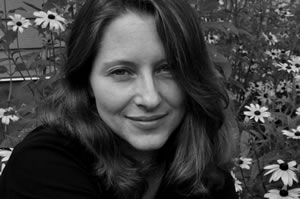Gillian Burnes

photo credit: Ian Burnes |
Gillian Burnes's reporting has appeared in Outside, OnEarth, Wilderness, and other magazines and was briefly broadcast from WUNC-FM public radio before it was discovered she had a voice for print. She studied English literature at East Carolina University and the University of Delaware and journalism at UNC-Chapel Hill. Now a freelance copy editor who works for Skiing, SKI, the Outside Buyer's Guide, and other publications, she lives in central Maine with her husband and daughter and temporary populations of pigs and chickens. "Transit," her first published short story, will appear in Issue 92 of Glimmer Train. | |
Two Minds |
 |
|
In the middle of a Vipassana meditation retreat last summer, in a converted Jesuit monastery that felt like a pleasant mid-eighties community college, I went up to the teacher at the end of the dharma talk and said, as sweetly as I could, "Editors are usually really nice people." He'd been using "editor" to stand for the harsh inner voice of self-loathing, and of course I understood what he meant, but as a magazine copy editor I had to stand up for my professional brotherhood. Practically all the CEs and story editors I know are sweethearts who depend for their livelihood on error and are happy to help others succeed without receiving any credit. (I could also make a case for nonstop focus on fine detail as a species of mindfulness practice.) How much more Buddhistly benign can you get? My teacher chuckled and promised to quit slandering editors immediately. That after-class conversation made me think a lot, though, about the classic dichotomy of the analytic mind and the associative mind, the disciplinarian and the playful child, the editor and the creator. Freewriting exercises don't work for me; I wind up embarrassed even though nobody's allowed to see the results. Rapid generation can be liberating, but I need normal syntax and punctuation or I get anxious. A novelist who lives in my little town graciously agreed to have coffee with me and talk about writing, and by the end of our chat I was arguing with her: There's meaning in punctuation! I'd have to stop my stream of consciousness and edit out the commas and periods! She was unmoved: Explode the shackles of grammar and mechanics or you'll never find your true voice! She might be right. She is, after all, the one with the long list of publications, and the eight hours a day I spend seeking and destroying sentence-level imperfections might indeed account for a scarcity of Csikszentmihalyian "flow" in my last 23 years as an adult aspiring writer. I just wonder if there might be another sort of exercise for dyed-in-the-wool grammatists like me. Here's my idea. As we all know, fiction writing requires both unselfconscious free association and a great deal of restraint and good judgment—that ruthless sensitivity to cliché, excess, skimpiness, tone-breaking, general stupidity, and all the other literary offenses. The trick, it seems to me, is to be able to shift from one mode to the other quickly and comfortably, back and forth, many times per paragraph. So for twenty minutes a day I intend to solve a long-division problem (analysis) and then list umpteen ways to use a Band-Aid (generation); alphabetize the names of my husband's cousins (analysis) and then narrate the thoughts of a cockroach (generation); and so on. I'm no neurologist, but I imagine an upgrade in the electrical switch between two big brain areas, each of which should grow more densely and finely wired. And I imagine more productivity and less pain when I'm at the computer. I hope so. If you try it, send me an e-mail and let me know if you notice any extra nimbleness…or extra calm. I'll get started myself as soon as I've finished this file of page proofs. | |
